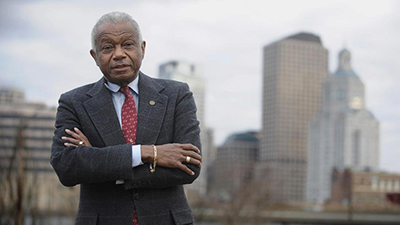The Connecticut NAACP says that former Hartford Mayor Thirman Milner has died
By The Associated Press
(Source: abcnews)
HARTFORD, Conn. — Former Hartford Mayor Thirman Milner, the first popularly elected Black mayor in New England, has died, the Connecticut NAACP said on Friday. He was 91.
Milner’s death was announced Friday afternoon in a statement on the Instagram page for the Connecticut Conference of the NAACP.
“His tenure was marked by significant strides towards equity, justice, and empowerment for all,” the statement said, adding that memorial arrangements would be forthcoming. The statement did not specify exactly when or where Milner had died.
Milner was the first popularly elected Black mayor in New England. He served as Hartford’s Democratic mayor from 1981 to 1987. He also served as a Connecticut state representative and state senator. He was also a former president and lifetime member of the Greater Hartford NAACP, the organization said.
Democratic Gov. Ned Lamont praised Milner in a statement recognizing his contributions in politics and his civil rights work, which included marching with Martin Luther King, Jr., saying, “he used his influence to enact positive change in Hartford, particularly focusing many of his efforts on the need to ensure that all children – no matter their family’s income level or the neighborhood where they grew up – have access to a quality education that prepares them for success.”
Milner was a descendant of enslaved Black and Native American ancestors, according to a profile of him written by The Associated Press in 2010 upon the release of his memoir “Up from Slavery: A History from Slavery to City Hall in New England.” He was raised by a widowed mother who got by, in part, with help from government assistance.
“The proudest thing in my life was not becoming mayor myself, but the fact that it gave my mother a chance to see her youngest son become mayor of the city where she grew up,” Milner said at the time.
His life experience was informed by his work and those he met along the way, ranging from Nelson Mandela to Jimmy Carter, Bishop Desmond Tutu and President Barack Obama.

